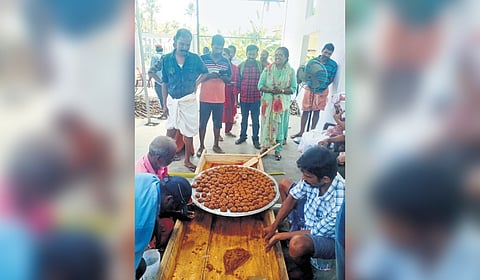

KOCHI: Alangadan Sharkara is back. It has been 40 years since the iconic jaggery brand disappeared from the shelves in Kerala. Now, the first batch of homegrown and homemade Alangad jaggery has re-entered the market. Having worked continually for around three months, the sugarcane-processing unit at Alangad has started churning out jaggery. So far, the unit has produced a total of 1,000kg of jaggery, which is priced at Rs 180 per kg.
Industries Minister P Rajeeve told TNIE, “For now, sugarcane for the production of Alangadan Sharkara is being cultivated on a 16-acre farm. The aim is to expand the cultivation to 50 acres.”
He said the project was launched as part of the ‘Krishikkoppam Kalamassery’ initiative that envisions the development of agriculture in the village. “Under the initiative, water bodies are being restored, irrigation systems are being improved, and efforts are being made to bring back traditional agricultural produce and to create value-added products from them,” Rajeeve said.
According to Alangad panchayat president P M Manaf, the crop is being cultivated at Neerikode, Kongorpilly and Thiruvallur. “The initiative is receiving all support from the Ernakulam Krishi Vigyan Kendra (KVK), Alangad Cooperative Bank, Krishi Bhavan, agriculture department, Atma, and Alangad block panchayat,” he added.
Further, Rajeeve said some of the texts associated with Kerala’s trading history mentions Alangad jaggery. “It is said that the jaggery was even exported to China in the distant past. The jaggery was said to have medicinal properties. The different taste has been attributed to the quality of the soil where it grows. Unlike jaggery from other areas, Alangadan Sharkara is known for its pure sweetness. And this is what made the jaggery famous and was considered to be fit for royal families,” the minister said.
According to Jayaprakash, of the Alangad Cooperative Bank, full-fledged production using the entire harvest from the 16 acres will happen by February or march 2025.
As per a document by ICAR-KVK Ernakulam, the sugarcane, particularly in the Periyar basin, holds significant historical significance in Kerala for its production of jaggery. “Despite the rich history, sugarcane farming in Kerala faced challenges like low profitability, high labour costs, and competition from cheaper alternatives, leading to a decline in quality and quantity of jaggery, particularly the renowned Alangadan Sharkara,” it said.